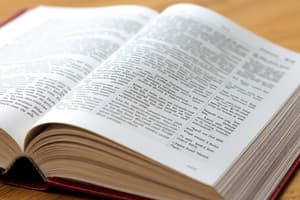Podcast
Questions and Answers
Which characteristic is LEAST likely to be found in an academic text?
Which characteristic is LEAST likely to be found in an academic text?
- Use of specialized terminology relevant to the field
- Formal language and style, avoiding contractions
- Objective analysis of a topic
- Personal anecdotes and emotional appeals (correct)
What is the primary purpose of an academic text?
What is the primary purpose of an academic text?
- To express personal opinions and biases on a subject
- To persuade the reader to adopt a particular political stance
- To debate a specific question and enhance the understanding of a subject (correct)
- To entertain the reader with engaging narratives
Which of the following is NOT typically considered an academic text?
Which of the following is NOT typically considered an academic text?
- A doctoral thesis
- A university-level textbook
- A peer reviewed scientific paper
- A popular blog post on current events (correct)
In the 'Before Reading' stage of studying academic texts, what is the most accurate way to determine the purpose of the text?
In the 'Before Reading' stage of studying academic texts, what is the most accurate way to determine the purpose of the text?
During the reading process of an academic text, what is the benefit of summarizing each section?
During the reading process of an academic text, what is the benefit of summarizing each section?
What should you do in the 'After Reading' stage of engaging with academic texts?
What should you do in the 'After Reading' stage of engaging with academic texts?
Which section of a reaction paper contains the writer's overall assessment and final thoughts on the work?
Which section of a reaction paper contains the writer's overall assessment and final thoughts on the work?
Which of the following BEST describes the purpose of the introduction in a position paper?
Which of the following BEST describes the purpose of the introduction in a position paper?
In a position paper, what is the purpose of including a discussion of counterclaims?
In a position paper, what is the purpose of including a discussion of counterclaims?
When writing the body of a position paper, what should be included to support your opinion?
When writing the body of a position paper, what should be included to support your opinion?
Flashcards
Academic Text
Academic Text
A formal, objective, and specialized text written by experts in a field.
Purpose of Academic Texts
Purpose of Academic Texts
To debate a specific question or enhance understanding of the subject.
Examples of Academic Texts
Examples of Academic Texts
Essays, textbooks, theses, case studies, and reports.
Before Reading Strategies
Before Reading Strategies
Signup and view all the flashcards
During Reading Strategies
During Reading Strategies
Signup and view all the flashcards
After Reading Strategies
After Reading Strategies
Signup and view all the flashcards
Reaction Paper
Reaction Paper
Signup and view all the flashcards
Reaction Paper Structure
Reaction Paper Structure
Signup and view all the flashcards
Position Paper
Position Paper
Signup and view all the flashcards
Position Paper Structure
Position Paper Structure
Signup and view all the flashcards
Study Notes
- Academic texts are critical, objective, specialized works written by experts.
- Academic texts employ formal language and style.
- These texts are factual, evidence-based, concise, clear, accurate, and well-structured.
- They avoid repetition, exaggeration, contractions, and are generally written in the third person.
- The purpose of academic texts is to debate or answer specific questions and enhance understanding of a subject.
- Examples of academic texts include essays, textbooks, theses, case studies, and reports like reaction papers, position papers, scientific papers, and concept papers.
Strategies for Reading Academic Texts
- Before reading, determine the purpose, preview the text, consider prior knowledge, set questions, and identify relevant words.
- During reading, survey the text, focus on the purpose, summarize main ideas, and do a second reading to review important words.
- After reading, list new words and evaluate the content against prior knowledge, noting alignments, conflicts, or new perspectives.
Reaction Paper
- A reaction paper is a written assignment presenting a personal opinion on a given work.
- The introduction should provide a brief summary of the work and introduce the main idea of the paper.
- The body entails the main ideas, arguments, and evidence discussed in detail.
- The conclusion should summarize thoughts and opinions, with a final impression for the reader.
- A list of citations including sources used in the paper should be present.
Position Paper
- A position paper is an essay presenting an arguable opinion about an issue.
- Begin by introducing the topic and asserting your view of the issue.
- The body includes background information with evidence, and discussion of both sides.
- Give a summary of the counterclaims and provide information that may be used to support them.
- Educated opinion about your position in the issue using reliable sources.
- Restate your point of view and state your resolution in the conclusion.
- The aim of a position paper is to convince the audience, support your argument with evidence.
Studying That Suits You
Use AI to generate personalized quizzes and flashcards to suit your learning preferences.




